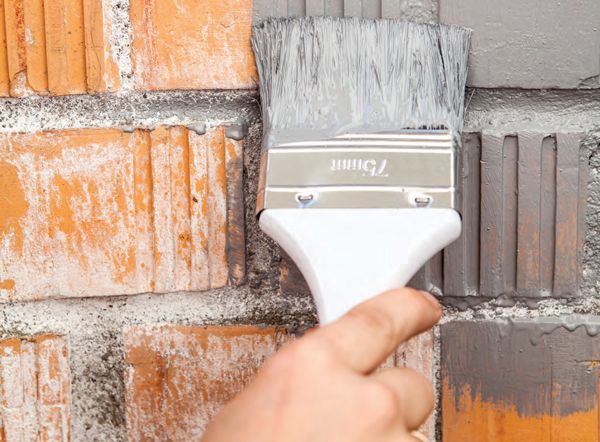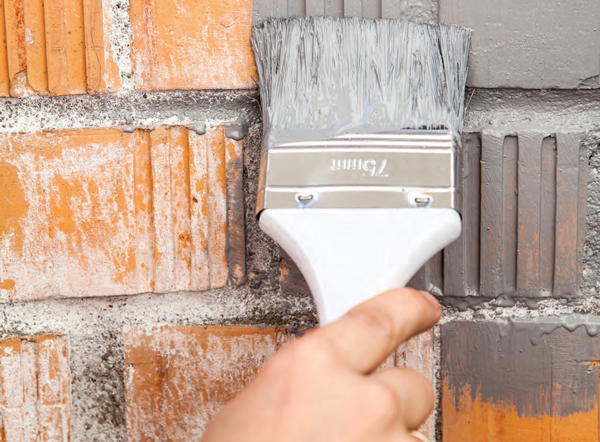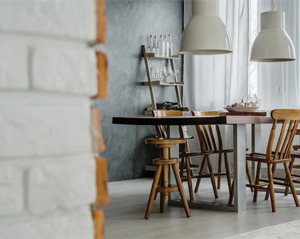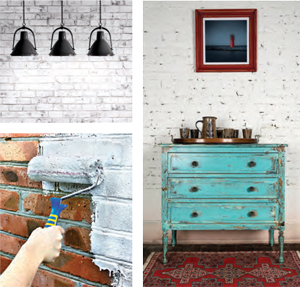Painting Brick | What to Know Before Brightening and Lightening


With winter upon us, you may find yourself pondering a change around the house. Painting brick has been around for decades, but has become a popular trend in recent years, both inside and out. Typically, the outside of a home is a common place to find brick, not only on exterior walls, but also on outdoor steps and patios. Inside, brick fireplaces, accent walls, or brick columns can be found in many homes. Painted brick is a great way to create a fresh, updated look, but knowing the right way to do it is important—no one enjoys the look of peeling paint! The tricky part of making the decision tends to come down to something very simple—brick is generally not used in homes with the intention of being painted. So, there are a few things to be aware of when considering painting over original brick.
To paint, or not to paint
While some homeowners prefer to leave brick in its original state, there can be valid reasons to paint it. Some brick is much darker than others, and giving it a lighter coat of paint can help make a space look brighter. Perhaps it’s stained and difficult to clean. Also, some brick may give off red dust, and paint can help to seal it. Of course, if brick has previously been painted, it is fine to paint again, and may need freshening up.
 When deciding whether to paint exterior or interior brick, know that the paint may never completely come off after it has been applied, so be prepared to stick with the decision! Before beginning any project, assess the condition of the brick. If there is any chipping, deterioration, or major imperfections, it might be best to either leave it be or have repair work done first. If it appears the brick has mold, moss, or is beginning to crumble, a deeper problem most likely exists, one having to do with moisture, and you’ll want to have it looked at by a professional. If your brick is in good condition, then it’s time to prep your project.
When deciding whether to paint exterior or interior brick, know that the paint may never completely come off after it has been applied, so be prepared to stick with the decision! Before beginning any project, assess the condition of the brick. If there is any chipping, deterioration, or major imperfections, it might be best to either leave it be or have repair work done first. If it appears the brick has mold, moss, or is beginning to crumble, a deeper problem most likely exists, one having to do with moisture, and you’ll want to have it looked at by a professional. If your brick is in good condition, then it’s time to prep your project.
Prep work
Painting brick is not quite like painting a wall, cabinet, or even ceiling in the house. It will take a little extra preparation to be sure the process goes well, and the product looks as good as possible. The brick should be cleaned and primed before painting. For interior projects, after cleaning the brick with soap and water or a wire brush, it is a good idea to vacuum the area. Make sure the brick is completely dry before priming. Choose a masonry primer, and be prepared to apply extra coats if needed. It may be helpful to use a one-inch bristle brush and mini roller to apply the primer. Brick is porous, so make sure you have plenty of primer, and apply carefully according to directions, so that the paint will adhere correctly.
 The painting process
The painting process
The type of paint will vary depending on the area. Acrylic latex paint will be the right choice for interior brick projects. Elastodynamic or acrylic latex paint are the best options for painting exterior brick. When painting exterior surfaces, it may be easier to use a paint sprayer when applying. It will go on more easily and evenly, better covering grooves and imperfections. A roller—at least three-quarters of an inch thick will work, but it may require some added brush work in between the bricks, and can be harder to get an even look.
The heat of the fireplace needs to be considered when painting a brick surround. Using high-heat paint is best for this area—check your local hardware store or online retailers. It’s your choice when it comes to paint sheen, but matte is a popular option. A paint sprayer is likely to get messy here, so it’s probably best to use a two-inch brush to apply the paint, and finish with a six-and-a-half inch roller with at least a half inch nap. Once your fireplace is painted, it’s best to stick with fairly small fires or candles to avoid damage.
DIY or hire a pro?
As with anything DIY, the biggest perk is usually the amount of money which can be saved! DIY projects can also be done over a longer period of time, at your own leisure. There is no worry of workmen being around and having to rearrange parts of your daily schedule to accommodate them. However, there are some good reasons to hire a professional. Painting brick can be a detailed job, and mistakes aren’t easily corrected. Professionals know exactly what they are doing and what supplies—including the correct paint—are needed for the project. Pros should be covered by insurance and are able to fix problems which may arise in the process. And unless you have years of practice, the overall quality of a professional job is likely to be better than DIY. Each option has its benefits and considerations, and it’s up to you to decide which of them is most important.
Although painting brick requires a bit of planning and knowhow, the finished result is dramatic and can add new life to your home. If you are in the mood for an update, it may be worth considering. Whether hiring a pro or doing it yourself, painting brick can take a dull fireplace or tired exterior brick from drab to fab! ✦
Acrylic latex paint, diy projects, Elastodynamic paint, exteriors, improve, interiors, painted brick, painted bricks, Prep work






